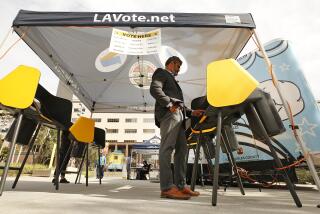Conflict-of-Interest Charges Filed Against El Segundo Councilman
Ten conflict-of-interest charges have been filed against El Segundo Councilman H. R. (Bob) Anderson by fellow Councilman Scot D. Dannen, who alleges that Anderson improperly voted or discussed matters affecting Chevron U.S.A. and its oil refinery while owning 6,600 shares of its stock.
The 10 charges were filed Thursday with the state Fair Political Practices Commission. Dannen claims Anderson has “willingly and knowingly broken the law” by participating in decisions that applied only to Chevron and in decisions that affected various businesses in the city, including Chevron.
Dannen said the alleged conflict has opened to legal challenge the council’s decisions on matters dating back to May, 1988. They include city business license fees, a building inspection program, a utility users tax and a subdivision of Chevron land, according to documents filed with the FPPC.
Anderson said he has done nothing improper and labeled Dannen’s action a political attack. Anderson said he has yet to decide whether to seek reelection when his term expires in April. Chevron, which founded El Segundo nearly 80 years ago as a refinery town, is a major landowner and taxpayer in the city.
Though Dannen said he wants to improve ethics in city politics, he also said he would like to see Anderson off the council because Anderson is biased toward business.
Anderson denied having such a bias, though he stated that local businesses are overtaxed.
Councilman Alan West has sided with Anderson, but Councilman Jim Clutter said Dannen has raised a valid issue concerning the possible legal jeopardy created for the city by Anderson’s alleged conflict. Mayor Carl Jacobson declined to comment.
Dannen said he knows of no one considering a challenge to city actions based on the possible conflict.
FPPC spokeswoman Sandra Michioku confirmed Dannen’s filing on Thursday and said it will be reviewed to determine whether a violation may have occurred. State law requires a public official to refrain from “participating in or making governmental decisions which could materially affect the financial interest of the official,” she said.
Anderson, who was a Chevron employee for 36 years until he retired as a maintenance superintendent in 1983, said he acquired his Chevron common stock through an employee stock purchase plan. The value of the stock is about $445,000. He said his ownership is insignificant in comparison to the more than 342 million outstanding Chevron shares.
Dannen said the conflict filing was sparked at a Dec. 20 closed council session in which Anderson discussed the extent of his Chevron holdings. Although Anderson said his financial interest statement filed with the city lists ownership of Chevron stock valued in excess of $100,000, Dannen--as well as Jacobson and Clutter--said they did not know of the amount until the meeting.
In the open council meeting that followed the closed session, Anderson abstained when the council adopted a building ordinance that eliminated a city inspector program in which employees of large companies--including Chevron-- were deputized to do certain city inspections on company property.
Anderson, however, participated in the 5-0 vote at that meeting to change language in the terms of deed for land along Sepulveda Boulevard that Chevron had donated to the city in 1988. The 25 acres included a golf course and contained deed restrictions limiting its use. It was valued between $12 and $15 million at the time.
The action removed land-use rights retained by Chevron that the company felt could interfere with its receiving a tax deduction for the gift. At the same time, it gave the city more flexibility in developing the land.
Anderson said he abstained on the Building Code vote on the advice of City Atty. Leland Dolley because elimination of deputy inspectors could cost Chevron substantial amounts of money in inspection delays. But he said he voted on the Sepulveda land lease changes because the city, not Chevron, benefited. He said the land was a donation and the city now will be able “to develop the property to the fullest extent.”
Dannen, however, asserts that Chevron will receive a “considerable tax advantage” from the vote. He charged Anderson with voting to help Chevron and to protect his stock investment.
Dolley declined to comment on any of the advice he gave the council as city attorney.
Although Anderson said he does not believe his votes have been improper, he said: “If I’m at fault, I take the responsibility.” He said that in the future, he will vote “on nothing affecting Chevron.”
More to Read
Sign up for Essential California
The most important California stories and recommendations in your inbox every morning.
You may occasionally receive promotional content from the Los Angeles Times.









